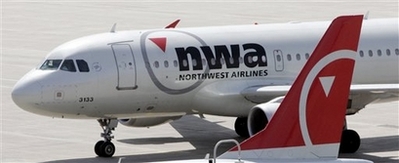Delta, Northwest lose $10.5B on fuel, charges
(Agencies)
Updated: 2008-04-24 08:34
Updated: 2008-04-24 08:34
ATLANTA - Delta and Northwest, seeking to combine to create the world's largest airline, posted losses Wednesday totaling $10.5 billion for the first three months of the year due to exorbitant fuel prices and write-downs of their companies' value.
 A Northwest Airlines plane arrives at a gate Wednesday, April 23, 2008 at Minneapolis-St. Paul International Airport in Minneapolis. Northwest Airlines Corp. reported Wednesday a fourth quarter loss of $4.14 billion on a management account charge and higher fuel prices. [Agencies] |
Southwest's chief executive, meanwhile, indicated that the carrier wasn't interested in a merger and said the very thought of it was daunting.
The figures from Delta and Northwest follow large losses at other carriers, such as United Airlines parent UAL Corp., which earlier this week reported a $537 million first-quarter loss on higher fuel costs, and likely rank among the industry's largest quarterly losses ever.
That red ink puts into focus the enormity of the challenge the industry faces to become profitable again amid $120-a-barrel oil -- even with the benefits that consolidation can bring.
"All airlines are in the same boat," said Calyon Securities analyst Ray Neidl. "The industry cannot make money at the current ticket fare levels. Seats have to come out of the market. To cover higher fuel costs, air fares have to go up."
Atlanta-based Delta Air Lines Inc., the nation's third-largest carrier, said its loss widened in the first quarter to a whopping $6.39 billion. A few hours later, Eagan, Minn.-based Northwest Airlines Corp. reported a $4.1 billion loss for the period.
Delta's results badly missed Wall Street expectations, despite a 12 percent increase in sales.
Excluding special items -- primarily a $6.1 billion non-cash charge relating to the drop in Delta's market value due to sustained record fuel prices -- the airline lost $274 million in the first quarter. A spokeswoman said Delta would have recorded the charge regardless of the tie-up with Northwest.
Northwest took a $3.9 billion charge of its own related to its market value decline. Its loss came despite a 9 percent increase in sales, and Northwest, too, missed analysts' earnings expectations.
Excluding the accounting charge and losses from some fuel hedges, Northwest said it would have lost $191 million in the quarter.
In a memo to Delta employees Wednesday, Ed Bastian, Delta's president and chief financial officer, said the airline expects some of its peers to record similar accounting adjustments.
John Heimlich, chief economist for the Air Transport Association, said the industry is now likely to report a "multibillion loss" this year.
"When all the results are in, this will be one of the worst quarters for the industry in its history," he said.
The airline industry's biggest annual loss came in 2002, in the wake of the Sept. 11 attacks, when carriers reported a combined loss of $11 billion, according to the ATA.
More recently, airlines have been hampered by the steep rise in fuel prices. Delta recorded a $585 million year-over-year increase in the cost of fuel in the first quarter, while Northwest's fuel costs increased $445 million from a year earlier.
When it emerged from Chapter 11 protection a year ago, Delta projected its stock would be worth $9.4 billion to $12 billion in all, but that was assuming crude oil would cost $70 per barrel. Delta's current market value is roughly $2.6 billion.
The company announced last week that it would acquire Northwest in a stock-swap deal, which still must be approved by regulators and shareholders.
|
||
|
||
|
|
|
|

